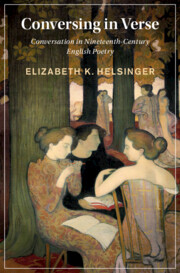Book contents
- Conversing in Verse
- Cambridge Studies in Nineteenth-Century Literature and Culture
- Conversing in Verse
- Copyright page
- Contents
- Figures
- Acknowledgments
- Chapter 1 Introduction: A Poetics of Encounter
- Chapter 2 Dialogue and the Idyll: Tennyson and Landor
- Chapter 3 Performing Conversation: Swinburne and Robert Browning
- Chapter 4 Projects of Animation: Coleridge and Clare
- Chapter 5 Ecphrastic Questions: Dante Gabriel Rossetti and Michael Field
- Chapter 6 Cruel Intimacies: Christina Rossetti and Thomas Hardy
- Epilogue
- Notes
- Bibliography
- Index
- Cambridge Studies in Nineteenth-Century Literature and Culture
Chapter 4 - Projects of Animation: Coleridge and Clare
Published online by Cambridge University Press: 21 July 2022
- Conversing in Verse
- Cambridge Studies in Nineteenth-Century Literature and Culture
- Conversing in Verse
- Copyright page
- Contents
- Figures
- Acknowledgments
- Chapter 1 Introduction: A Poetics of Encounter
- Chapter 2 Dialogue and the Idyll: Tennyson and Landor
- Chapter 3 Performing Conversation: Swinburne and Robert Browning
- Chapter 4 Projects of Animation: Coleridge and Clare
- Chapter 5 Ecphrastic Questions: Dante Gabriel Rossetti and Michael Field
- Chapter 6 Cruel Intimacies: Christina Rossetti and Thomas Hardy
- Epilogue
- Notes
- Bibliography
- Index
- Cambridge Studies in Nineteenth-Century Literature and Culture
Summary
Chapter 4 takes personification as its point of departure in the wake of Wordsworth’s well-known dismissal of it. From this perspective, Coleridge’s early conversation poems – where a tenuous reciprocity with the natural world is with difficulty achieved through the unfolding artifice of the poem – and Clare’s recreations in verse of remembered conversations with self-personifying natural things are inventive extensions of eighteenth-century methods for putting human beings into social converse with the natural world. Both, the chapter argues, are instances of what Jonathan Culler calls “projects of animation”: poems where more subtle practices of personification support a poetry that reaches out to a chattering world of non-human beings and things to make them talk not only to each other but also, at least in poetry, to us. Such tactics seemed altogether more possible, however, early in the century than toward its close – as the poetry of Swinburne’s French correspondents, Charles Baudelaire and Stéphane Mallarmé, makes clear.
Keywords
- Type
- Chapter
- Information
- Conversing in VerseConversation in Nineteenth-Century English Poetry, pp. 90 - 109Publisher: Cambridge University PressPrint publication year: 2022

